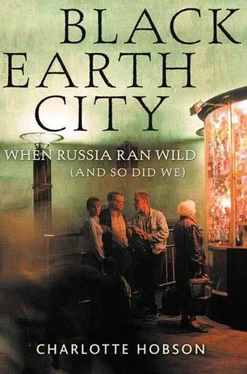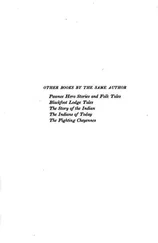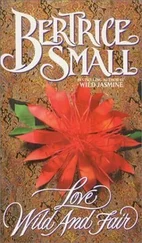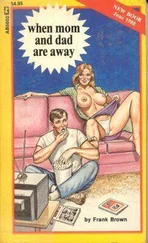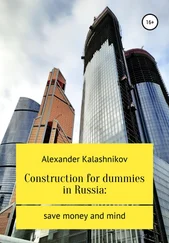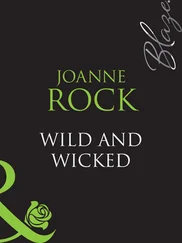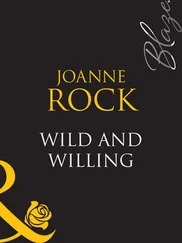Charlotte Hobson
BLACK EARTH CITY
WHEN RUSSIA RAN WILD
(and So Did We)

There was a time before I was old enough for school when my mother and I visited Russia once a week. “Welcome to Russia,” the lady said, each time she swung open her front door to us. Russia consisted of an overheated apartment just outside Southampton, full of photographs of ballet dancers. In the front room, where I was sent to play, two unfriendly, stiff-legged pugs lay snoring on the carpet. I didn’t object, however, because of the miraculous house that sat on top of the television. It had gingerbread walls and spun sugar icicles hanging off the roof and its path was paved with chocolates and lined with jelly flowers. While my mother declined Russian nouns, I climbed on a chair and passed the time in awed and loving contemplation of the house. She always bribed me not to touch it. “A chocolate bar on the way home if you leave the house alone.” Every week the temptation was too great. A little piece of the back wall and an icicle or two would disappear, and my mother and the lady would emerge at the end of her lesson to find sugary smears across my cheeks and a welling of guilty tears. Thus I discovered that Russia was forbidden and that it tasted of gingerbread.
My mother never gave up her Russian lessons. Between driving four children to school, delivering stews to her parents, knitting sweaters like hairy beasts, and cooking for a stream of guests, she would pull a tattered notebook out of her handbag and memorize Russian vocabulary. Sometimes she’d teach me a few words: snyeg idyot —it’s snowing—sounded like little hooves. On Saturday mornings, I’d climb into her bed while she did her homework. Lying in the curve of her waist and watching the strange letters flow from her green felt-tip pen, I pondered the fact that my grandfather Igor was born in a yellow house in Moscow and bound in swaddling clothes. We had an icon from that house, a Madonna encased in silver plate with glass jewels in her crown, and Russian Easter eggs made of wax with velvet ribbons. All of these and my grandfather, wrapped like a jelly roll: I turned the images over in my head and grinned to myself under the bedclothes.
My mother was born Tatyana Vinogradoff, a little girl with white-blond hair and a blue-eyed, smooth-cheeked look that made my heart leap a hundred times when later I recognized it on the streets in Russia. She came from a Muscovite family of academics and teachers; her grandfather, Pavel Gavrilovich Vinogradoff, taught at Moscow University until he moved to Britain and became Professor of Jurisprudence at Oxford in 1903. In the black-and-white photograph on my mother’s desk he had a statuesque quality that made it hard to believe he’d ever really lived.
If Russia meant anyone real to me, it meant my mother’s father, Grandpa Igor, a large, square, adorable man with a walking stick that he wielded for emphasis. In his youth he had a passionate temperament, and once my father met a man who remembered him at university: “Ah, dear Igor… the only fellow who’d come for a drink and eat the glass.”
In the nineteen twenties, he’d fought a duel with sabers; a couple of decades later, so the story went, he wrestled Lucian Freud to the ground and bit him on the ankle. By the time I knew him, he was an affectionate, learned old man with a habit of repeating his remarks three times over. “Dear girl,” he called me, “dear girl. Dear girl.” On one occasion, he was surprised to find that the shops were shut.
“It’s Good Friday, Igor,” he was told.
“Oh,” said Igor. “Poor chap. Poor chap. Poor chap.”
It was Igor who suggested a dark side to Russia. When I was seven he told me—perhaps, in his absentminded way, forgetting whom he was talking to—that children in the Soviet Union were taught to inform on their parents at school. By the time they came home their mothers and fathers were gone, vanished into the camps.
“But why?” I demanded.
“Because that’s how the Bolsheviks operate,” Igor answered, thumping his stick on the floor.
Igor had good reason to hate the Communist Party. All the relations the Vinogradoffs left behind when they moved to Oxford were dead by 1931. Four of Igor’s five uncles and four of his cousins died in the civil war. His only surviving aunt, Lisa, the principal of a girls’ school in Moscow, starved to death by the end of the twenties. Her letters simply stopped arriving.
The Vinogradoffs were typical Moscow intelligenty, professors and teachers, supporters of constitutional reform. They belonged to the moderate professional middle class that was just beginning to assert itself in Russia at the end of the nineteenth century—a class the Bolsheviks destroyed with great thoroughness. The figure who surfaced most often in my dreams was poor Lisa, who had starved. I imagined her growing weak and her stomach swelling up. I think it struck me particularly that such a fate should befall a school principal.
My mother’s hopes that I would learn Russian in school came to nothing. The Russian teacher left because of lack of demand and I lost interest when I became a teenager. I avoided the thought of Russia; in fact I avoided thought of any kind. My mother was ill, my life was flying past in a daze. After my grandfather Igor waved his stick at Miss Hunter and insisted that our history books were full of Bolshevik propaganda, Russia lodged itself firmly in the category of things that made my toes curl. When the time came for university, I thought of studying Arabic. The course would involve travel to exotic places; I imagined Souks and starry nights in the desert. What was more, I had no family connections with the Arab world; surely none of them would be able to embarrass me there.
And then my mother died. She’d had cancer. It was not sudden, and yet I was a seventeen-year-old in a daydream, who’d assumed such a thing was not possible.
Eighteen months later I arrived at the University of Edinburgh and found my way to the Department of Arabic, a little Georgian terrace on Buccleuch Place. The professor was welcoming. “Come in, come in,” he bustled. “Arabic honors, isn’t that right?”
“That’s what I want to talk to you about,” I stammered. “I’m afraid I’ve changed my mind. I don’t want to read Arabic after all.”
“Oh lord,” said the professor. “Bang goes the funding for our language assistant.”
So at last I did as my mother wanted, and began to learn Russian.
August 19, 1991: BBC Breakfast News
On the screen, tanks rolled silently through a leafy boulevard in north Moscow.
“Mikhail Gorbachev is no longer in charge of the Soviet Union,” a newsreader said. Moscow’s early-morning rush hour was under way and yellow buses were weaving in and out, dodging the gun barrels. Commuters pressed their faces against the bus windows and gaped. “All power has been transferred to a right-wing Emergency Committee, and tanks have been moving toward the center of Moscow for several hours. Russian television and radio stations are broadcasting only the Emergency Committee’s announcement and”—the camera cut, suddenly, to show the corps de ballet in Swan Lake pattering across a stage in their tutus—“Tchaikovsky. This appears to be a military coup.”
My friend Emily phoned halfway through the morning. “We can forget leaving for Russia in two weeks,” she said. “It looks bad.”
I had not moved away from the television. I’d covered many eventualities in my preparations for this journey, but a military coup was not one of them.
Читать дальше
